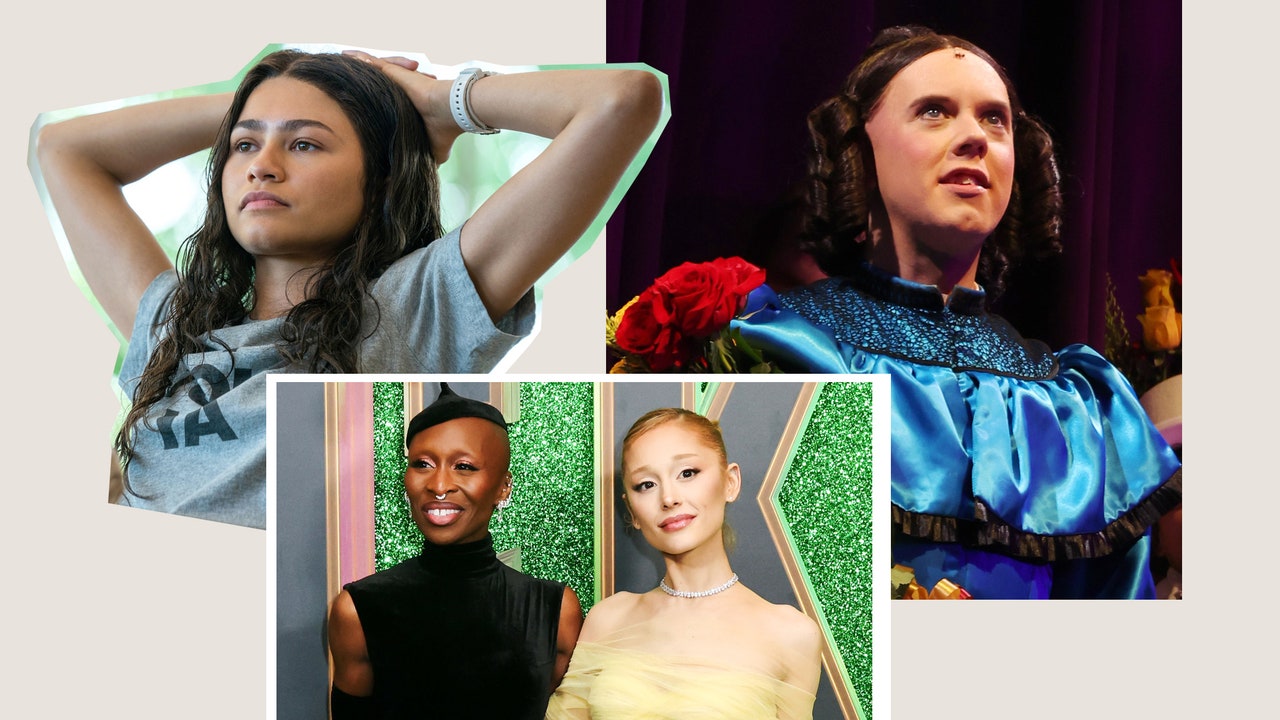
For the past several years now, Vanity Fair has capped off the year by assembling a list of our very favorite performances—by stars in films and on television, yes, but also by actors on Broadway, social media stars, and up-and-comers who have a knack for making any platform feel like a stage. This year we even broadened the umbrella to include a few indelible inanimate objects (because it’s our list, dammit!). Mostly, though, this is a place to celebrate the human beings we couldn’t stop watching and talking about in 2024—whether they appeared in Oscar-worthy films or just kept popping up on our TikToks.
Cole Escola, Oh, Mary!
Perhaps this fall’s hottest ticket on Broadway was a downtown-transfer absurdist comedy about the 16th president’s addled wife, Mary Todd Lincoln. It’s been a long time since something so organically oddball, so unexpected, took the White Way by storm. That’s thanks in large part to writer-star Cole Escola, long a cherished fixture of New York’s alternative-comedy scene, now enjoying well-deserved mainstream success—entirely on their own terms. As Mary Todd—a vain, booze-soaked aspiring cabaret star—Escola is a hoot, both detestable and strangely lovable. In their nimble verbal and physical performance, Escola is exhilarating, giving a shot of loopy energy to an industry in need of it. —Richard Lawson
Marianne Jean-Baptiste, Hard Truths
Marianne Jean-Baptiste’s performance in Mike Leigh’s Hard Truths is so good that I’d have a hard time picking out a favorite line delivery, as she spews an endless array of petty insults with such committed, outrageous relish. (A personal favorite? When admonishing a toddler’s outfit: “What’s a baby got pockets for?”) It’s also so good that I’ve found it impossible to shake the film’s final act, in which Jean-Baptiste’s Pansy, a loudly miserable Londoner living with her quiet husband and quieter son, faces down the reality of her bitter isolation from the rest of the world. Tragicomedy is a tough tone to pull off for anyone, but the miracle of Jean-Baptiste’s work is that you never feel the pull in either direction. She’s a riot and she’s heartbreaking—in concert, every shot of her is breathtaking. This is the most expansively human screen acting I’ve seen in years. —David Canfield
Timothée Chalamet, A Complete Unknown
In the weeks (and maybe years) leading up to A Complete Unknown’s release, there was plenty of concern about the film from Bob Dylan fans. Could filmmaker James Mangold make a movie that would do the iconic musician justice? More importantly, could Timothée Chalamet convincingly portray him? But when the film was finally unveiled, those fears were put to rest in the first moment we got to see Chalamet perform as Dylan. Mangold makes the smart choice to capture that first number in a long, wide shot, proving that the actor is really playing the guitar and singing himself. The scene is transfixing and inspiring: Chalamet somehow captures Dylan’s signature voice and mannerisms while making the song his own. And it only gets better as Chalamet transforms throughout the film, just as Dylan did with his increasing fame. As we now know, Chalamet spent five years learning to play and sing like Dylan; along the way, he also discovered how to capture much more of the musician’s enigmatic spirit. Chalamet has proven himself over and over with each new role he’s taken on, and with A Complete Unknown, he solidifies himself as one of the most talented and exciting actors of his generation. —Rebecca Ford
Clarence “Divine Eye” Maclin, Sing Sing
The word authenticity gets bandied around a lot when describing great performances—but perhaps no artist gave a more authentic performance this year than Clarence “Divine Eye” Maclin in Sing Sing, Greg Kwedar’s compassionate and stirring look at the Rehabilitation Through the Arts program at Sing Sing Correctional Facility. Playing a younger, fictionalized version of himself in a story he cocreated, Maclin brings every part of the 17 years he spent incarcerated at the maximum-security New York prison to Sing Sing. He builds on that foundation for a performance that’s at once soft and sharp, a rough exterior masking an undeniable charm and warmth. Acting opposite a career-best Colman Domingo, Oscar nominee Paul Raci, and a cadre of former inmates, Maclin shines as a hardened inmate who’s forced to wrestle with his demons when given the opportunity to step center stage, bare his soul, and, potentially, heal his wounds through the transformational power of theater. Maclin’s nuanced and vulnerable work is proof that immense talent can be found and nurtured anywhere. In a word, he’s divine. —Chris Murphy
Guy Pearce, The Brutalist
So much of The Brutalist hinges on Guy Pearce’s performance that it’s hard to imagine how director Brady Corbet could have made the film work without it. Throughout this three-and-a-half-hour film, the audience is never sure if Pearce’s Harrison Lee Van Buren is an actual admirer of architect László Tóth, played by Adrien Brody, or is just using Tóth to obtain some clout in the upper echelons of American society. At times, Pearce plays Van Buren as a dope; other times, he’s quite shrewd. When the film enters its explosive final act, Van Buren’s intentions become clear, and Pearce gives the role even more dimension. There are many great performances this year, but this role may have been the trickiest to execute. Without the nuances Pearce delivers, The Brutalist would crumble. —John Ross
The Daughters, His Three Daughters
One problem with being a member of a terrific ensemble is that no one knows which one of you to nominate for awards. This may be the problem faced by Carrie Coon, Natasha Lyonne, and Elizabeth Olsen, who are all so good in Azazel Jacobs’s bleary, intimate family drama that they cancel one another out. As three sisters awaiting the death of their father in his cramped Manhattan apartment, Coon, Lyonne, and Olsen are palpably human: prickly and hot to the touch, aching with resentment and regret. They work in beguiling harmony, carrying the film to its shattering, and yet also comforting, denouement. Maybe they could do it all over again onstage next year. —R.L.
Andrew Scott, Ripley
Andrew Scott’s performance in Netflix’s Ripley is so wildly different from Matt Damon’s in The Talented Mr. Ripley that it’s hard to imagine they’re playing the same character. Damon’s Ripley is constantly struggling with his identity and sexuality; Scott’s Ripley, though, is too busy being a sociopath to pay much attention to his id. There’s a ton of physicality to the role, particularly when Scott’s Ripley murders Dickie Greenleaf in a sequence that spans multiple scenes, tasking Scott with almost drowning and lugging huge objects across a deserted beach to cover up his crime. By the end of that episode, Scott looks physically exhausted from the gritty work of committing murder—but his Ripley is such a moral blank that he also finds wonderful shades of dark humor in the role. If Tom Ripley becomes a Hamlet-esque part that actors keep interpreting in new ways across generations, Scott’s version might go down as the meanest. Delicious! —J.R.
Naomi Scott, Smile 2
The conceit of the Smile films is a little silly: a demon drives you crazy until you kill yourself in front of someone else while grinning at them, thus passing the curse on to them. But Naomi Scott, who broke out in the live-action Aladdin remake a few years ago, manages to make it all feel pretty serious indeed. As a pop star suddenly afflicted by horrible visions of doom, Scott adds anguished depth to a scream-queen role, selling the audience on her existential doom. She puts the “elevate” in “elevated horror.” —R.L.
Leo Woodall, One Day
Those of us who first encountered the British actor Leo Woodall as a menacing hunk in season two of The White Lotus might not have expected that he was capable of something as sweet, sensitive, and fluid as his performance in Netflix’s miniseries adaptation of the beloved novel of the same name. And yet there Woodall is, lending such poignant texture and detail to his portrayal of a spoiled rich boy struggling to find himself over the course of many years. Yes, Woodall is easy on the eyes, but he even finds insightful ways to play that beauty. His is a full-bodied, thoughtful performance that augurs many great things for an actor on the come-up. —R.L.
RaMell Ross, Nickel Boys
A film about the trials and tribulations of two Black boys at a Florida reformatory school shot via shifting first-person perspectives might sound more like a gimmick than a great idea. But in director RaMell Ross’s incredibly capable hands, it’s nothing short of breathtaking. His adaptation of Colson Whitehead’s Pulitzer Prize–winning novel breaks with many of film’s modern conventions and notions, placing his audience in the shoes of young Elwood Curtis (Ethan Herisse), a promising student unjustly sent to the abusive Nickel Academy. There, he befriends Turner (Gotham Award winner Brandon Wilson). Caught by NYFCC-winning cinematographer Jomo Fray, the shifting point of view in Nickel Boys is incredibly visceral. You not only see every moment play out, but feel it—are present in it, implicated in it, immersed in it. On top of that, the archival footage Ross uniquely intersperses throughout the movie, depicting everything from Black children’s birthday parties to the Apollo 11 moon landing to clips from Sidney Poitier films, coalesces to create a completely engrossing, inventively artistic, and often devastating film. While all the performances are impressive, it’s Ross’s deft and daring touch behind the camera that reminds audiences that directing is an art. —C.M.
Nicola Coughlan, Bridgerton and Big Mood
She lived largely in the shadows of seasons one and two, but Coughlan’s spirited Penelope has always felt like the beating heart of Bridgerton—personification of the show’s twin pillars: breathless romance and tantalizing scandal. In Bridgerton’s record-breaking third season, Coughlan shines as the underestimated debutante turned covert gossip columnist who finally gets her day in the light alongside Luke Newton’s Colin. Her fellow Bridgerton star Jonathan Bailey has earned rightful plaudits for managing to shoot the series while also making two other high-profile projects—but Coughlan, too, did some juggling, spending her final three weeks on Bridgerton also leading the dark comedy Big Mood. There, she skillfully plays Maggie, a writer diagnosed with severe bipolar disorder. Maggie and Penelope are “chalk and cheese”—a cheeky British idiom for polar opposites—as Coughlan told Vanity Fair, and they’re an exciting taste of what’s possible from a performer at the top of her game. —Savannah Walsh
Carter Trozzolo, My Old Ass
Megan Park’s delightfully weird coming-of-age tale, My Old Ass—one of the best films of the year—stars Maisy Stella as Elliott, who, after a mushroom trip on her 18th birthday, meets her 39-year-old self (played by an on-point Aubrey Plaza). When she receives an ominous warning about her future, Elliott is forced to reckon with her life at home before heading off to college. There’s a lot to love here, but I was particularly taken by her Saoirse Ronan–obsessed little brother, Spencer, played with glittering charm by Canadian newcomer Carter Trozzolo. In his first-ever film, Trozzolo holds his own against his older castmates, showing off striking natural comedic timing and a tender touch. Whether he’s building a shrine to the Oscar-nominated actor or cuddling up with his sister to watch his favorite film, Greta Gerwig’s Little Women, the young actor is a scene-stealer. More Trozzolo in 2025, please! —Daniela Tijerina
Zendaya, Challengers
From Dune: Part Two to Challengers to the press-tour looks that accompanied each film, 2024 was Zendaya’s year. But she made the biggest waves in Luca Guadagnino’s steamy tennis saga—as well as in many, many memes. The best ones come from the pivotal scene in which Zendaya’s Tashi Duncan gives Josh O’Connor’s Patrick Zweig a well-deserved talking-to, making an expression that many women (especially Black women, and particularly Black women this year) know all too well. Zendaya knows a thing or two about what it’s like to go viral—and thankfully, it seems the Euphoria star has a sense of humor about it. In her interview for this year’s Vanity Fair Hollywood Issue, she shared that she appreciates her face being used for good: “People do take the funniest screenshots of me. I can’t help it…. If it brings people joy, then I love it. Screenshot away.” —Burake Teshome
Jacob Anderson, Interview With the Vampire
Interview With the Vampire loves its swirling, sweaty melodrama, and tends to ask its actors to go big—not an episode goes by without some combination of screaming, crying, and flamboyant bloodsucking. The cast has proven more than game, but lead Jacob Anderson especially embraced the majestic emotional range required of him in the show’s second season. Playing two versions of Louis de Pointe du Lac—about a century apart—the Game of Thrones alum situated our titular vampire in heavy states of lust, grief, and rage. The season culminated in a stunning romantic reunion with costar Sam Reid, with performances so explosive that the scene probably didn’t need to take place in the midst of a literal hurricane. But with this show, extra is to be expected and embraced. That goes especially for Anderson’s tour de force performance. —David Canfield
Jessica Gunning, Baby Reindeer
Baby Reindeer premiered on Netflix in April; within a week, the world had devoted itself to finding the real Martha Scott. Martha, played by Jessica Gunning in creator-writer Richard Gadd’s dramedy, is Gadd’s character’s stalker. She’s loud, obsessive, depressive, violent, funny, and anything but one-note. Sometimes, like Gadd’s Donny, we feel sorry for her. Sometimes, she’s terrifying. It’s a wonderful, Emmy-winning performance, though not if you ask Fiona Harvey—who came forward weeks after Baby Reindeer’s release to claim the character was based on her. On Piers Morgan’s YouTube show, Harvey disavowed many of the allegations put forth by Gadd. Yet immediately upon hearing Harvey speak, you’re left marveling at just how much she sounds like Gunning-as-Martha. It’s uncanny. On social media, audio from the show turned into viral memes; likewise, an entire monologue from Harvey’s interview was lifted and memed. Even with the two side by side, it’s hard to tell the difference between them. That’s how convincing Gunning is. Or how convincing Harvey is as…herself? Will the real Martha Scott please stand up? —J.R.
Phaedra Parks, The Traitors
Can you even imagine the look on the faces of this show’s editors when they got to see Real Housewives of Atlanta star Phaedra Parks turn to dweeby Peter Weber and declare, “This is not The Bachelor, and I don’t have to kiss your ass for a rose”? Even the other contestants in the room, all reality stars in their own right, couldn’t help but squeal with delight. Peacock took home an Emmy for season two of The Traitors in large part thanks to Parks, who delivered viral moment after viral moment. One way to make the Emmys less boring (they are boring!) would be to finally reward reality stars themselves. How fun would it be to see Parks accept an Emmy for best reality-television performance in a competition show? —J.R.
Mary M. Cosby, The Real Housewives of Salt Lake City
When Cosby was introduced on what has become the most consistent Housewives franchise, Bravo led with the fact that she married her stepgrandfather—at the dying request of her grandmother, Cosby was quick to note. A rocky few seasons followed. She delivered one-liners that were unpredictable and brutal—declaring that one fellow Housewife smelled “like hospital” and that another looked “inbred.” But by season three, Cosby’s mean-girl schtick had grown too dark to feel delicious. After a much-needed time-out, she wisely distanced herself from her title as first lady of a Pentecostal church and invested in some genuine friendships. When Cosby was brought back as a full-time cast member on the show’s most recent season, it was a complete return to form. She’s as quirky as ever—her slinking in late and inadvertently into the center of Meredith’s bat mitzvah is an all-time visual—but also completely vulnerable. Only Cosby could find a moment of levity in a powerful scene about her son Robert Jr.’s substance abuse problem. “I think I love you more than Dad,” she tells him with a tearful smile. “Don’t ever tell Dad I said that!” It was the first time I’d thought of Cosby’s husband all season. —S.W.
Sabrina Carpenter, Anywhere
Sabrina Carpenter may be Short n’ Sweet, but in 2024 the pop superstar was larger than life. After toiling away as a Disney star, Carpenter hit an all-time high with the debuts of hit singles “Espresso” and “Please Please Please,” followed by the release of her best-selling sixth studio album. Her hornier-than-thou live performances were a perfect supplement, imbued with innuendos at the ends of songs like “Nonsense” and more direct turns of phrase in songs like “Juno.” Some on social media have taken offense to her sexy, tongue-in-cheek style (doesn’t anyone want to have fun anymore?), but as she told VF earlier this year, she’s not taking any of it too seriously. Carpenter swears she’s “a very normal amount of horny.” —B.T.
The Hats, Conclave
Edward Berger’s middlebrow masterpiece begins with a shroud being placed over the old pope’s face—and from there, the headwear just does not let up. This movie is simply a feast of millinery, from the cute red skullcaps the cardinals wear as they deliberate—I know they’ve got an official name, but dare I call these accessories Catholic yarmulkes?—to the tall, proud mitres they don during more ceremonial moments to the chic little habits (very demure, very mindful) that adorn the nuns—led, of course, by fashion icon Isabella Rossellini—who quietly scheme as they serve the group. There are 108 men vying for power in this film, and each of them is dressed fabulously. Who needs Sabrina Carpenter’s “Feather” video when we’ve got Conclave? —Hillary Busis
Chappell Roan, Yelling at Photographers
This was the year Chappell Roan introduced a new trick for the Diva’s Guide to Divahood: yelling at photographers while being photographed on a red carpet. Sure, celebrities have yelled at the paparazzi before. But Roan’s taking that diva behavior to revolutionary new places. Her posing on a red carpet—dressed in a gauzy Joan of Arc outfit—turning her back to the camera, and then swinging around to yell back at a nameless photographer (“You shut the fuck up! Not me, bitch!”)? It made international news. It made red carpets relevant again! Roan perfected her craft further at the premiere of the Olivia Rodrigo concert film, confronting a photographer who allegedly was rude to Roan at a Grammy party. Of course, diva behavior only works if an artist has the talent to back it up—and Roan most definitely does. She ended her incredible breakout year with a performance on SNL that cemented her status as that girl, particularly with her rendition of “Pink Pony Club.” The way her gaze found the camera throughout the song was skillful yet effortless. What will Roan think of next? —J.R.
Jennifer Lopez and Ben Affleck, The Greatest Love Story Never Told
Who else but Jennifer Lopez would self-fund and release not one, but two projects centered on her trail of failed relationships—despite everyone’s best efforts to stop her? Lopez’s then husband, Ben Affleck, asks her that very question in one of those films, a documentary largely about their marriage called The Greatest Love Story Never Told. “I did really find the beauty and the poetry and the irony in the fact that it’s the greatest love story never told,” he says in the doc. “If you’re making a record about it, that seems kind of like telling it.” The film’s glimpses into Lopez and Affleck’s second chance romance make for a compelling case study of the struggle between the public and the personal. There are moments of Victoria and David Beckham–esque banter, like when Affleck pokes fun at Lopez for making herself younger in the other film, the fictionalized This Is Me…Now, or when the two reminisce about their 2003 flop, Gigli. But given that the couple publicly called it quits about six months after the doc’s release, it also serves as proof of the concern Jane Fonda expresses in the film itself: “It feels too much like you’re trying to prove something instead of living it.” —S.W.
Cynthia Erivo and Ariana Grande, the Wicked Press Tour
Both Cynthia Erivo and Ariana Grande give award-worthy performances as belting witch enemies turned belting witch besties in Wicked, Jon M. Chu’s epic adaptation of the beloved Broadway musical. And given their well-documented talents as performers, this might not come as a surprise. What we didn’t necessarily expect was how the pair would completely take over the cultural conversation this fall with their zany, emotional, endlessly fascinating press tour. Do they cry a lot? Absolutely. Do they love each other? It seems so. Did anyone understand what was happening during the now infamous “holding space” moment? Apparently not. Nevertheless, Wicked and the Wicked press tour have given our increasingly fractured entertainment landscape a rare moment of monoculture. The world couldn’t help but watch these women go full theater kid 100% of the time and, as a result, create the press tour of a lifetime. We’re holding space (on this list) for that. —C.M.
The Books, Wicked
Recording history and spreading knowledge are great and all, but 2024 is the year that books finally found their true purpose: being stepped on by Jonathan Bailey. In Wicked (part one!), Bailey’s pansexual-coded Prince Fiyero seemingly can’t see a book without his sweet brain hissing, You better step on that, or King Unnamed Daddy will take away your allowance. He stomps on them, slams them shut with his sassy little boots, and even surfs his way to glory on their wantonly spread pages. As Glinda, Ariana Grande also uses them to great flirtatious effect, and Cynthia Erivo’s Elphaba uses a silly-shaped one for some mammalian customization. But nothing can outshine those pulpy stars of the “Dancing Through Life” sequence, literally the best supporting performance of the year. Crack that spine, good sir. —Kase Wickman
Tina Fey, Las Culturistas
Replays of 30 Rock may be constant in this house, but I still didn’t realize how much I’d been missing Tina Fey of late until her viral appearance on the Las Culturistas podcast with Bowen Yang and Matt Rogers. The Saturday Night Live alum closed out her guest spot with some unforgettable advice for current cast member Yang as he ascends in fame. “Bowen Yang giving his real opinions about movies on this podcast—I regret to inform you that you are too famous now, sir,” she said, with Yang turning red in simultaneous agony and delight. “You have a problem with Saltburn? Shh. Quiet luxury.” The whole monologue was a masterfully threaded, expertly observed commentary on the state of nascent celebrity circa 2024, a reminder of how no one can put their finger on the cultural pulse quite like Fey. Its thesis came down to five devastatingly honest words: “Authenticity is dangerous and expensive.” —D.C.




